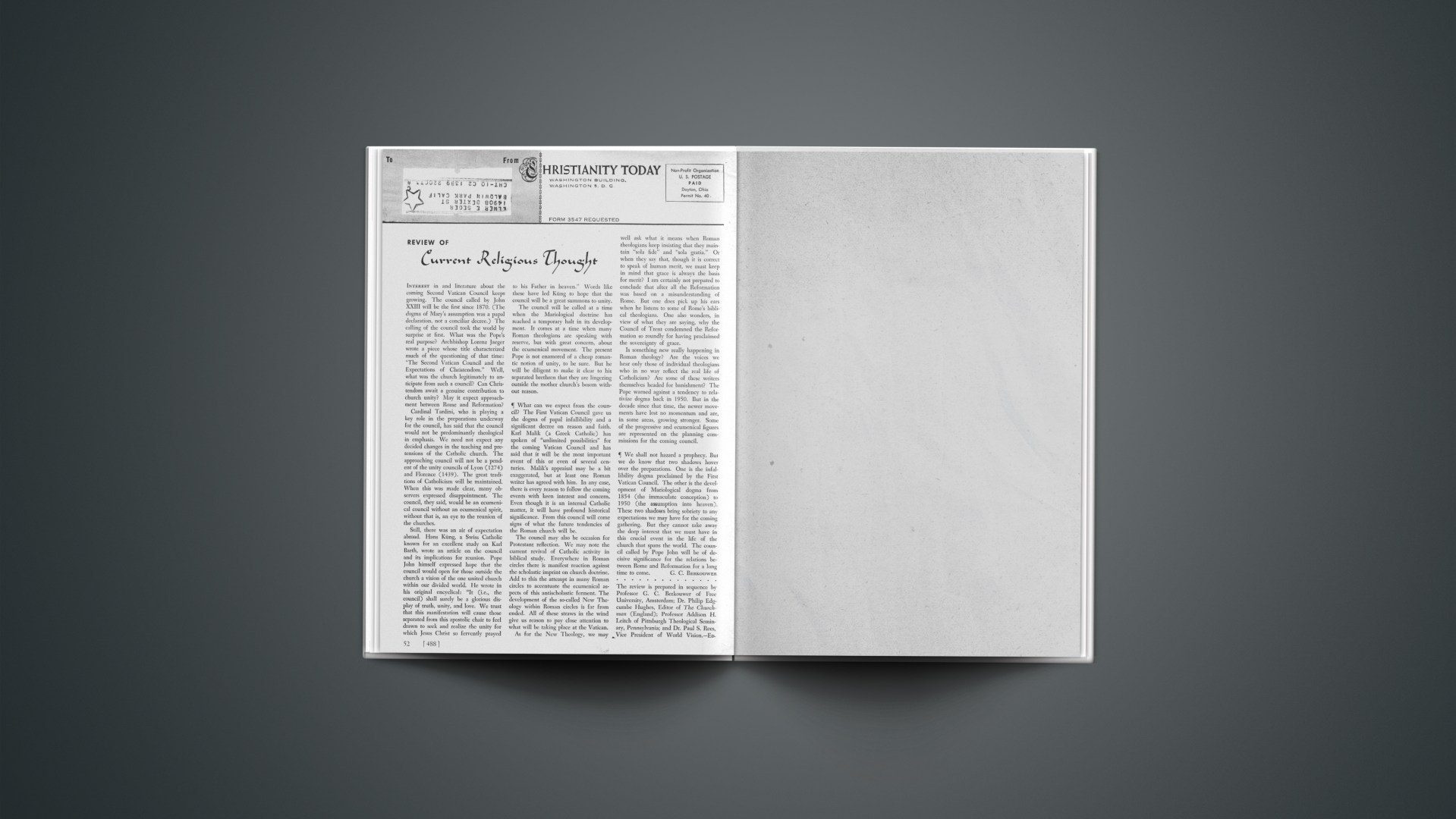Interest in and literature about the coming Second Vatican Council keeps growing. The council called by John XXIII will be the first since 1870. (The dogma of Mary’s assumption was a papal declaration, not a conciliar decree.) The calling of the council took the world by surprise at first. What was the Pope’s real purpose? Archbishop Lorenz Jaeger wrote a piece whose title characterized much of the questioning of that time: “The Second Vatican Council and the Expectations of Christendom.” Well, what was the church legitimately to anticipate from such a council? Can Christendom await a genuine contribution to church unity? May it expect approachment between Rome and Reformation?
Cardinal Tardini, who is playing a key role in the preparations underway for the council, has said that the council would not be predominantly theological in emphasis. We need not expect any decided changes in the teaching and pretensions of the Catholic church. The approaching council will not be a pendent of the unity councils of Lyon (1274) and Florence (1439). The great traditions of Catholicism will be maintained. When this was made clear, many observers expressed disappointment. The council, they said, would be an ecumenical council without an ecumenical spirit, without that is, an eye to the reunion of the churches.
Still, there was an air of expectation abroad. Hans Küng, a Swiss Catholic known for an excellent study on Karl Barth, wrote an article on the council and its implications for reunion. Pope John himself expressed hope that the council would open for those outside the church a vision of the one united church within our divided world. He wrote in his original encyclical: “It (i.e., the council) shall surely be a glorious display of truth, unity, and love. We trust that this manifestation will cause those separated from this apostolic chair to feel drawn to seek and realize the unity for which Jesus Christ so fervently prayed to his Father in heaven.” Words like these have led Küng to hope that the council will be a great summons to unity.
The council will be called at a time when the Mariological doctrine has reached a temporary halt in its development. It comes at a time when many Roman theologians are speaking with reserve, but with great concern, about the ecumenical movement. The present Pope is not enamored of a cheap romantic notion of unity, to be sure. But he will be diligent to make it clear to his separated brethren that they are lingering outside the mother church’s bosom without reason.
What can we expect from the council? The First Vatican Council gave us the dogma of papal infallibility and a significant decree on reason and faith. Karl Malik (a Greek Catholic) has spoken of “unlimited possibilities” for the coming Vatican Council and has said that it will be the most important event of this or even of several centuries. Malik’s appraisal may be a bit exaggerated, but at least one Roman writer has agreed with him. In any case, there is every reason to follow the coming events with keen interest and concern. Even though it is an internal Catholic matter, it will have profound historical significance. From this council will come signs of what the future tendencies of the Roman church will be.
The council may also be occasion for Protestant reflection. We may note the current revival of Catholic activity in biblical study. Everywhere in Roman circles there is manifest reaction against the scholastic imprint on church doctrine. Add to this the attempt in many Roman circles to accentuate the ecumenical aspects of this antischolastic ferment. The development of the so-called New Theology within Roman circles is far from ended. All of these straws in the wind give us reason to pay close attention to what will be taking place at the Vatican.
As for the New Theology, we may well ask what it means when Roman theologians keep insisting that they maintain “sola fide” and “sola gratia.” Or when they say that, though it is correct to speak of human merit, we must keep in mind that grace is always the basis for merit? I am certainly not prepared to conclude that after all the Reformation was based on a misunderstanding of Rome. But one does pick up his ears when he listens to some of Rome’s biblical theologians. One also wonders, in view of what they are saying, why the Council of Trent condemned the Reformation so roundly for having proclaimed the sovereignty of grace.
Is something new really happening in Roman theology? Are the voices we hear only those of individual theologians who in no way reflect the real life of Catholicism? Are some of these writers themselves headed for banishment? The Pope warned against a tendency to relativize dogma back in 1950. But in the decade since that time, the newer movements have lost no momentum and are, in some areas, growing stronger. Some of the progressive and ecumenical figures are represented on the planning commissions for the coming council.
We shall not hazard a prophecy. But we do know that two shadows hover over the preparations. One is the infallibility dogma proclaimed by the First Vatican Council. The other is the development of Mariological dogma from 1854 (the immaculate conception) to 1950 (the assumption into heaven). These two shadows bring sobriety to any expectations we may have for the coming gathering. But they cannot take away the deep interest that we must have in this crucial event in the life of the church that spans the world. The council called by Pope John will be of decisive significance for the relations between Rome and Reformation for a long time to come.
The review is prepared in sequence by Professor G. C. Berkouwer of Free University, Amsterdam; Dr. Philip Edgcumbe Hughes, Editor of The Churchman (England); Professor Addison H. Leitch of Pittsburgh Theological Seminary, Pennsylvania; and Dr. Paul S. Rees, Vice President of World Vision.
—ED.










